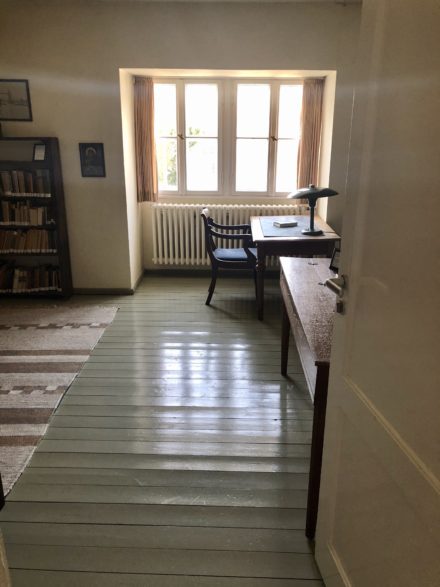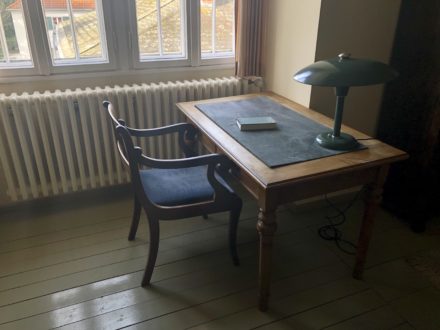
Sermons
The Word: Liberating and Free
March 1, 2020
First Sunday in Lent/ 1 March 2020
And so we find Jesus in the wilderness of Judea, sent there, thrown there by the Spirit. Not for a vacation or a spiritual retreat. Jesus was sent to the wilderness to be tempted by the devil. Sent there by God to test his mettle, for him to struggle, to suffer, suffer through the struggle of being confronted by an alien force sent to test him. The Greek refers to the devil as diabolos (from which we get “diabolical”), but it doesn’t mean a guy in a red suit, pointy tail, and pitchfork. The word means to “casts through,” to cut through, a force that tries to split you. The Spirit led him to the wilderness for a test. Jesus prepared for the fight by fasting for forty days and nights. By that time he was famished. And that’s the time when diabolos appears.
“If you are the Son of God…” “If…” Diabolos reaches for his doubt, his weakness. He’s trying to put a wedge between who Jesus knows himself to be and whatever self-doubts he might have had, and he tries to entice Jesus to use his powers to reach for what he wants at that moment (namely, bread). Jesus resists, “It is written, ‘One does not live by bread alone, but by every word that comes from the mouth of God,’” citing Deuteronomy 8:3. In the second temptation, diabolos shows his cunning; even he can quote scripture. He cites psalm 91:11-12 for Jesus, “He will command his angels concerning you,” and “On their hands they will bear you up so that you will not dash your foot against a stone.” And Jesus says, “Again it is written, “Do not put the Lord your God to the test,” citing Deuteronomy (6:10). And finally, one more contest, showing Jesus all the kingdoms of the world and their splendor. But Jesus doesn’t want all that, “For it is written, “Worship the Lord your God, and serve only him,” again from Deuteronomy (6:13).
Three times the devil tempted Jesus in the wilderness. One time, the devil himself quotes scripture, because he knows the religious texts as well as anyone. As Shakespeare notes in The Merchant of Venice, “Mark you this, Bassanio. The devil can cite scripture for his purpose.” Three times Jesus resists by citing scripture, reminding the devil about the true nature and purpose of the Word of God. The Word is free, radical and, therefore, always liberating.
You see, it’s easy to quote scripture and make the Bible say whatever you want it to say. People do this all the time. Preachers do it, and politicians. This doesn’t mean that scripture isn’t important or that we can forget the Bible. It’s not that simple. When the church refers to the Bible as the Word of God we’re not referring to the actual words on the page—which fundamentalists often forget (or have never known otherwise). Instead, we’re staying that it contains the language of God. We could say, the Bible bears witness to the Word—capital “w”—behind the words; it’s a testimony to what God’s people have heard when God has spoken to them. God’s Word is creative and dynamic. God speaks and new worlds come into being. God speaks and we hear. God speaks and we are formed and reformed. God speaks and things happen to us. God’s Word is free, because God is free and cannot be bound by human language. God’s Word, the Word that comes through scripture, cannot be co-opted by humans or placed in service to evil ends. It is always free. We never understand God’s Word, we stand under it, we stand under its authority, under its judgement, and stand within its freedom to say what it will say. God’s Word, therefore, is always destabilizing to human experience because we can never say, “Now we got it. Now we know that this text ‘means,’ and now we can use it for our own ends.” Whoever claims this is dangerous and should not be trusted. The Bible cannot limit the Word. When we introduce the reading of scripture each week in worship we never say, “Listen to the Word of God.” We say, “Listen for the Word of God.” We are called to listen for what’s speaking through the text, from beyond the text. The church is formed and endures only because it is responding to what it hears, to the hearing of the Word. And when the Word is heard and lived it is always liberating. Because it’s God’s Word, not human words about God. And the Word is always free.
When we hear the free Word of God, something happens in us. We share in some of that freedom, and it frees us. We discover the freedom be faithful, the freedom to act, even the freedom to act in defiance or resistance against the powers that be, the powers that want to split and divide us, both personally and collectively in our lives. And this is important to remember because a lot of damage can be done by those who use scripture for their own ends, who fail to differentiate the Word of God from one’s own words or philosophies. Then the words of scripture can easily be used to defend almost any political view, or personal bias, personal values, justify our actions (or inaction), justify indifference, inhumanity, or cruelty, even justify our theologies and beliefs. It’s easy to hide behind the Bible.
I was reminded of this several weeks ago when I was studying in Europe. I had an opportunity to go to Berlin for the weekend, the first time back in thirty years. This time I really wanted to visit some of the places associated with Dietrich Bonhoeffer (1906-1945), the Lutheran pastor and theologian, who was involved in a plot to assassinate Hitler. The plot failed, Hitler survived, and Bonhoeffer and others were arrested, tried, sent to prison, and eventually executed by the Nazis. Bonhoeffer was part of the Confessing Church in Germany. The Confessing Church was made up of individual Christians and congregations that refused to worship Hitler as the embodiment of God’s blessing and will for Germany. In 1934, leaders of the movement met in Barmen to declare their allegiance to Christ as Lord and not any would-be fuehrer. I went to the German Resistance Memorial Center, situated in the building where the plot to kill Hitler was planned. There was a very moving tribute to the resistance movement, including the Confessing Church. In one of the display cases was the Barmen Declaration, itself, now part of our Book of Confessions, which is part of the Constitution of the Presbyterian Church (USA). “We reject the false doctrine, as though the church in human arrogance could place the Word and work of the Lord in the service of any arbitrarily chosen desires, purpose, and plans.”[1]
And I had an opportunity to visit the home of Bonhoeffer’s parents, where he lived at the time of his arrest on 5th April 1943. The home is now a museum and a center for Christian peace and justice. Bonhoeffer’s bedroom, which was also his study, was on the third floor. We were escorted up the stairs and invited into the room: there were bookshelves lining two of the walls built by him, there was a bed, his clavichord (he was a gifted musician), and near the window, was his desk and chair. The guide pointed toward the desk and said that’s where he was sitting when he was arrested by the Gestapo. At that moment, when I imagined what that must have felt like for him, I had to catch my breath. I was standing on holy ground. It was intense. The guide gave us some time to be with our thoughts and feelings. I eventually went downstairs, but before leaving the house I had to go back to his room one more time and touch his desk.
In April 1938, Bonhoeffer preached a sermon to the confirmation class of the Zionskirche, a church located in a working-class neighborhood of Berlin. I thought of these words reflecting on Matthew 4 and the life we’re called to in faith. These words capture something of Jesus’ experience in the wilderness: “Faith is a decision. We cannot avoid that. “You cannot serve two masters”; from now on either you serve God alone or you do not serve God at all. Now you only have one Lord, who is the Lord of the world, who is the Savior of the world, who is the one who creates the world anew. To serve him is your highest honor. But to this Yes to God belongs an equally clear No. Your Yes to God demands your No to all injustice, to all evil, to all lies, to all oppression and violation of the weak and poor, to all godlessness and mocking of the Holy. Your Yes to God demands a brave No to everything that will ever hinder you from serving God alone, whether it be your profession, your property, your house, your honor before the world. Faith means decision.”[2]
Our Yes to God demands our No to evil and lies. That’s what the wilderness continues to teach us: how to say Yes and how to say No. May we, too, have the courage to say Yes and to say No.


===========================================================================
[1] “Declaration of Barmen,” The Constitution of the Presbyterian Church (U.S.A.), Part I: Book of Confessions 8.27.
[2] Sermon preached on April 9, 1938. Dietrich Bonhoeffer, Theological Education Underground:1937-1940 in Dietrich Bonhoeffer Works, Vol. 15. Victoria J. Barnett, ed. (Minneapolis: Fortress, 2012), 476-480.